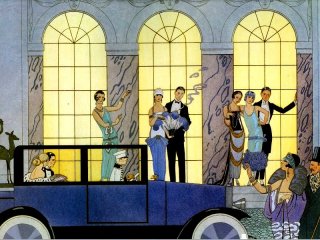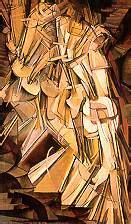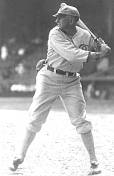Jazz Age Culture
Part II

Nichols Home Page // Jazz Age Part I // Jazz Age Writers

"Nude Descending a Staircase, No.
2" (1912)
by Marcel Duchamp
"In Zürich in 1915, losing interest in the
slaughterhouses of the world war, . . . we
searched for an elementary art that would, we
thought, save mankind from the furious folly
of those times."
(from Hans Arp, "Dadaland," 1948)
"The exhibition of the new art from Europe dropped like a bomb. Before the people could gain their breath, some prune-fattened authorities of the old regime at once hurled the pits and stones of their wrath and contempt against the cubists." (from an Oscar Bleumner article in Alfred Stieglitz's Camera Work, 1913)
"In iterature, in art, in music--the post-war theme is similar: abandon tradition, experiment with the unknown, change the rules, dare to be different, innovate, and above all, expose the sham of western civilization." (from Steven Kreis, "The Age of Anxiety," 2000)

Lois Mailou Jones
Les Fetisches [masks]
"Our problem is to conceive, develop, establish an art era. Not white art painting black...let's bare our arms and plunge them deep through laughter, through pain, through sorrow, through hope, through disappointment, into the very depths of the souls of our people and drag forth material crude, rough, neglected. Then let's sing it, dance it, write it, paint it. Let's do the impossible. Let's create something transcendentally material, mystically objective. Earthy. Spiritually earthy. Dynamic."
(Aaron Douglas)
"Sometimes she entered works in exhibitions that did not recognize African-American artists by having white friends deliver the paintings. In other cases, prizes initially awarded to her on merit were subsequently taken away and given to white competitors. " (from The life and art of Lois Mailou Jones" Tritobia Hayes Benjamin, 1994)

Did "Shoeless" Joe Jackson
throw the 1919 World Series?
"The uncertainties of 1919 were over--there seemed little doubt
about what was going to happen--America was going on the greatest, gaudiest spree in history. . . .
The whole golden boom was in the air--its
splendid generosities, its outrageous corruptions. . . ."
(from F. Scott Fitzgerald, The Crack-Up)
". . . the new Klan was going to mean business. And that soon meant expanding its list of enemies to include Asians, immigrants, bootleggers, dope, graft, night clubs and road houses, violation of the Sabbath, sex, pre- and extra-marital escapades and scandalous behavior. The Klan, with its new mission of social vigilance, soon had organizers scouring the nation . . . ." (from Southern Poverty Law Center, "100 Years of Terror")

Go to Jazz Age Part I or Jazz Age Writers
Return to Nichols Home Page
Image, top of page: "Farewell" (1920) by Georges Barbier